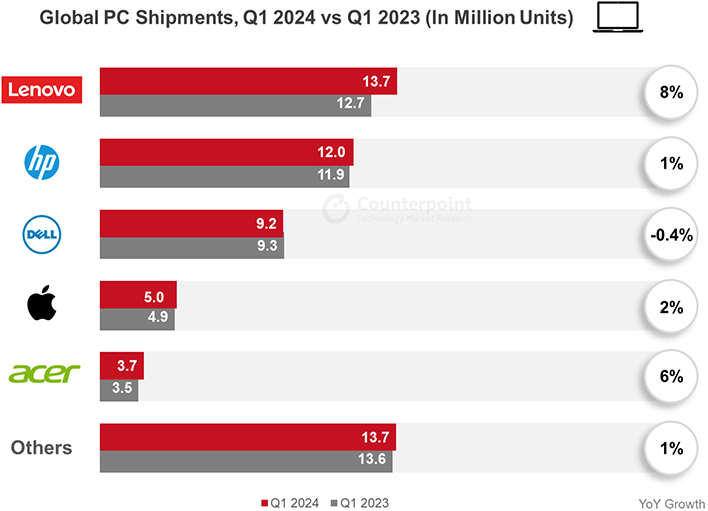Following a brutal eight quarters of declining shipments, the PC market is back on the upswing, growing in the neighborhood of 3% in the first quarter of 2024, according the latest audit by the bean counters at Counterpoint Research. Not surprisingly, the long overdue return to growth comes on the heels of an industry-wide push into AI territory and the advent of what's being marketed as the
AI PC.
What exactly is an AI PC? There's no single definition, but it's essentially any system that comes equipped with dedicated AI hardware. This notably includes Intel's latest-generation
Core Ultra processors based on Meteor Lake and AMD's
Ryzen 8040 and 7040 chips—all of these feature integrated neural processing units (NPUs), a class of specialized hardware designed to accelerate machine learning tasks.
It can also refer to an ecosystem as a whole, such as Google's Chromebook Plus platform (like Acer's recently announced
Chomebook Plus 514). These laptops don't have any NPU hardware inside, but they are more powerful than standard Chromebooks and enable access to AI-powered tools.
Many of these systems are just now trickling into the marketplace. Nevertheless, it's fair to say that the AI hype train has left the station and is gaining momentum. According to Counterpoint Research, 2024 is the "first chapter of the AI PC," including both desktops and laptops. Pertaining to the latter, the market research firm anticipates 45% of new laptops shipping with AI capabilities this year. It also views AI as a "catalyst in driving overall PC shipment recovery in 2024," which it expects to continue into proceeding years.
"We believe the shipment and deployment of generative AI laptops will accelerate in 2025-2026, along with emerging generative AI functions and use cases, supported by chip vendors’ new processor platforms," said William Li, a senior analyst at Counterpoint Research.
So far, Lenovo is the biggest beneficiary of the AI PC revolution. Lenovo's first quarter shipments jumped 8% to 13.7 million units. HP notched the second most shipments at 12 million units, as HP and Lenovo often jockey for the top spot. In terms of the growth rate, however, Acer saw the second biggest surge with a 6% percent spike to 3.7 million units. Curiously, Dell's shipments slipped a tad (0.4%), though it shipped the third most PCs with 9.2 million units.
The latest
PC shipment numbers also reflect a return to growth after manufacturers implement inventory corrections in the previous quarters. That said, you can expect AI to be a major selling point going forward, which could see PC shipments surge as businesses and consumers scramble to upgrade.

